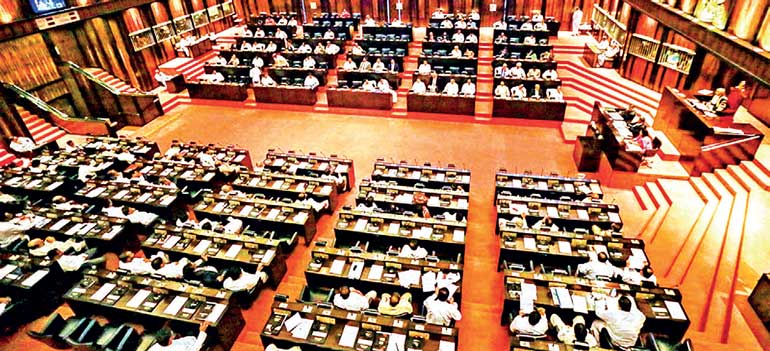Sunday Feb 15, 2026
Sunday Feb 15, 2026
Tuesday, 9 August 2022 03:14 - - {{hitsCtrl.values.hits}}

“Extreme poverty is abject, violates basic rights and is a political choice. IMF needs to move beyond seeing it as just another abstract item on a balance sheet” – UN Special Rapporteur on Extreme Poverty and Human Rights Philip Alston
 Most of the parliamentary Opposition having met with President Ranil Wickremesinghe over the last week, a week that saw escalating repression of the Aragalaya protesters, some have applauded the “All/Multi-Party Governance” arrangement that the President has proffered to engage them in the task of economic stabilisation, reform and recovery.
Most of the parliamentary Opposition having met with President Ranil Wickremesinghe over the last week, a week that saw escalating repression of the Aragalaya protesters, some have applauded the “All/Multi-Party Governance” arrangement that the President has proffered to engage them in the task of economic stabilisation, reform and recovery.
The main Opposition the SJB’s requests at the meeting for the revocation of the recently imposed Emergency regulations and a halt to the arrests, were not presented as conditional to their participation in a new mechanism of governance in Parliament. The President’s reply, played on the evening news, seemed to indicate that he believed the retention of the draconian Emergency was necessary to prevent delays in passing new regulations for economic recovery that he envisaged as necessary, because, he said, “if someone were to go to courts, it could take weeks”.
With the mainstream parliamentary Opposition deciding to consider the formula of an arrangement where the manifestly unpopular SLPP has a majority of seats in Parliament, together with the latter’s choice of an unpopular, unelected President, both associated with bad policies and corruption on a very large scale, it is hardly the time to leave our destinies to the Parliament. It is now incumbent on civil society and the people themselves to closely monitor the decisions made in Parliament, not least in terms of the human rights impact of those decisions.
The Aragalaya mindset
The post-Aragalaya political and civic consciousness of the people of Sri Lanka will not regard the 225 members of Parliament as acting in good faith and axiomatically in the interest of their constituents. The public now believes the opposite, with good reason.
The new President’s aggressive targeting of protesters no sooner than he stepped into his new shoes, only confirms their worst fears. Avidly conscious of their human rights, the young people who flocked in tens of thousands and later hundreds of thousands to the protest sites currently being cleared off the Galle Face area, will inevitably reemerge, perhaps elsewhere.
In formulating legislation and policies for economic recovery in this difficult period, all those involved in any multi-party governance arrangement will be held individually and collectively responsible for their conduct by this “woke” generation of new voters, watching out for the usual predisposition to self-serving bias in the decisions they make.
Human rights during economic crisis
Two Special Rapporteurs of the UNHRC, tasked with setting up some general principles for monitoring the ‘proper management of assemblies’, came up with a number of general principles to guide the application of international human rights standards. The 2016 report confirms that:
“The ability to assemble and act collectively is vital to democratic, economic, social and personal development, to the expression of ideas and to fostering engaged citizenry. Assemblies can make a positive contribution to the development of democratic systems and, alongside elections, play a fundamental role in public participation, holding governments accountable and expressing the will of the people as part of the democratic processes.” [A/HRC/31/66]
Of relevance here is the Rapporteur’s observation that “despite the increasingly prominent role that assemblies play in today’s world, there is sometimes a lack of clear understanding of the applicable international human rights law and standards.”
At the June 2022 sessions, the Special Rapporteur (SR) on Freedom of Assembly presented a report on Access to Resources where he stated that: “The right of associations to freely access human, material and financial resources – from domestic, foreign, and international sources – is inherent in the right to freedom of association and essential to the existence and effective operations of any association.”
These observations are especially important to reiterate at a time of economic crisis, when people plunged into extreme poverty by the policy-makers have little opportunity to hold them accountable except through public protests. It is an effective method also to ensure the stabilisation-reform-recovery process doesn’t further povertise them while sparing the rich.
At the same session, the SR warned Sri Lanka to “immediately end all forms of …harassment of and reprisals against human rights defenders... In light of what appears to be a pattern of surveillance, harassment and reprisals, the Special Rapporteur reiterates his call on Sri Lanka to immediately end all attacks on human rights defenders and victims of human rights violations with the utmost urgency.” [A/HRC/50/23/Add.3]
This appeal has obviously fallen on deaf ears. If anything, the repression has escalated since then. It is critical that the Opposition parties insist to their “multi-party governance” host and proposer, that the people are not denied their rights to protest, when they have been denied most of their essentials, and are set to suffer even more. It is hoped that collective responsibility for the decisions made in any proposed “multiparty governance” arrangement will ensure close attention to how governance is carried out by that structure. Stability, regularly articulated as essential for recovery, will depend on it.
IMF and human rights
While most heaved a sigh of relief that the Government decided to work with the IMF, it is however important to reflect on the role of civil society and people’s movements in monitoring the process of negotiations with the IMF for their human rights impact.
A report was submitted to the Human Rights Council in 2018 by the Special Rapporteur on Extreme Poverty and Human Rights, on the approach of the IMF to human rights issues, particularly relating to poverty. It observes that “No international institution exerts greater influence than IMF over issues such as distribution, including social protection.” [A/HRC/38/33]
While giving credit to the IMF for recently changing its stance that it was “a monetary agency, not a development agency”, to admitting it is “much more than a monetary agency”, the Report alerts the UNHRC that “The consistent practice of IMF has been to sidestep them [Human Rights considerations] and assume they are simply not relevant to macroeconomic policy.”
Highlighting the IMF’s preference for “macrostability” which the Rapporteur says “favours minimizing public expenditures, and most Governments’ preference to use savings for more politically popular programmes” he warns that this combination could lead to “significant net reductions in social protection spending.”
It appears that reliance has to be placed on the “multi-party arrangement” to ensure that human rights impact of the agreement with the IMF is taken into account, given that the Special Rapporteur concludes that “the social safety net approach generally adopted by IMF is often so minimal that it barely warrants the term “social protection”.
Relying on politicians however would be suicidal for the vast number of Sri Lankans already in poverty due exactly to the lack of forethought in policy-making by all parties that have governed the country, and therefore would require enhanced vigilance of civil society, the human rights community, the civic resistance movements and the United Nations agencies.
While recommending the IMF’s increased cooperation with UN agencies, the Report warns that “social protection cooperation between IMF and United Nations agencies, including ILO, has been marginal at best.”
In its conclusions the report states crucially that extreme poverty “is a political choice.” It urges the human rights community to “start undertaking serious engagement with, and scrutiny of, the work of IMF. Its work has significant human rights impacts and fiscal consolidation policies can make or break rights.”
It elaborates further, making a point especially pertinent to Sri Lanka at this moment:
“Fiscal consolidation, for example, is not neutral; it can be elite-reinforcing, or it can be pro-poor, or much in between. The choices that are made reflect values, and the means of fiscal consolidation should not become ends in themselves.”
I would say that this observation proves that people’s movements and civil society should keep even a sharper eye on how the Sri Lankan State conducts its negotiations and assess its guiding values. This is especially critical when the President has already indicated that he means to use the Emergency regulations in the economic domain, which almost certainly includes imposing the IMF agreements.